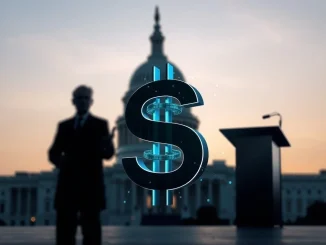
Big news from South Korea! The nation is taking significant steps to shape its digital asset landscape, particularly focusing on stablecoins. If you’re involved in the crypto space, whether as an investor, developer, or enthusiast, understanding the evolving regulatory environment is crucial. South Korea, a major player in the global crypto market, is signaling a clear intent to bring more structure and safety to this innovative sector through new South Korea crypto regulation.
Why Stablecoin Regulation South Korea is Becoming a Priority
Stablecoins, designed to maintain a stable value relative to a specific asset like the US dollar or gold, have become a cornerstone of the crypto ecosystem. They facilitate trading, lending, and payments within the digital asset space. However, recent market events globally have highlighted potential risks associated with stablecoins, particularly concerning their reserves and transparency. This has prompted regulators worldwide, including in South Korea, to consider stricter oversight. The goal is typically twofold: protect investors and maintain financial stability. By establishing clear rules, authorities aim to build confidence in the market and prevent potential systemic risks that could arise from unstable or opaque stablecoin operations.
Key Details of the Proposed South Korea Crypto Bill
According to reports from News1, lawmakers from South Korea’s ruling Democratic Party are preparing to introduce a significant South Korea crypto bill as early as July. This proposed legislation builds upon earlier regulatory discussions and aims to create a more robust framework for the digital asset sector. While promoting innovation remains a stated objective, the emphasis appears to be heavily on strengthening consumer protection and market integrity, especially concerning stablecoins. The bill reportedly stems from a previous proposal by lawmaker Min Byoung-dug, indicating ongoing legislative efforts in this area.
The $735K Capital Rule and Other Requirements for Stablecoins
One of the most notable aspects of the upcoming bill is the stringent requirements it plans to impose on stablecoin issuers. If passed, these issuers would need to meet a set of 12 specific conditions to operate legally in South Korea. A headline requirement is the minimum capital threshold: issuers must hold at least one billion won, which translates to approximately $734,000 – $735k stablecoin capital, depending on the exact exchange rate at the time. This capital requirement is intended to ensure that issuers have sufficient financial backing.
Beyond the capital, other critical conditions reportedly include:
- **Executive Eligibility:** Appointing executives who meet stringent eligibility criteria aligned with financial company governance laws. This aims to ensure leadership is competent and adheres to high ethical standards.
- **User Redemption Policies:** Establishing clear, transparent, and reliable policies for users to redeem their stablecoins for the underlying reserve assets. This is vital for maintaining the stable peg.
- **Reserve Asset Management:** Setting rigorous standards for how reserve assets backing the stablecoins are managed. This includes rules on asset types, custody, and potentially regular audits to verify reserves.
These requirements collectively aim to enhance the stability, transparency, and trustworthiness of stablecoins operating within the South Korean market.
Broader Impact of Digital Asset Regulation in South Korea
This proposed bill is part of a larger trend towards comprehensive digital asset regulation in South Korea. The government and lawmakers have been actively working on frameworks to cover various aspects of the crypto market, including exchanges, token issuance, and investor protection. Stricter rules for stablecoins could have several ripple effects:
- **Market Consolidation:** Smaller stablecoin projects might find it challenging to meet the capital and compliance requirements, potentially leading to market consolidation.
- **Increased Investor Confidence:** Clearer rules and oversight could attract more traditional investors who have been hesitant due to regulatory uncertainty.
- **Innovation Focus:** While compliance costs may increase, a clear framework can also provide certainty, potentially encouraging innovation within the defined boundaries.
- **Global Influence:** South Korea’s approach could influence regulatory discussions in other countries, adding to the global mosaic of crypto regulations.
The move signifies South Korea’s commitment to integrating digital assets into its financial system responsibly, balancing the potential for innovation with the need to safeguard market integrity and protect participants.
Summary: A New Era for South Korean Crypto
South Korea is on the cusp of introducing significant legislation that could redefine the operational landscape for stablecoins and other digital assets. The proposed bill, expected in July, underscores the ruling party’s focus on strengthening regulation, particularly by requiring stablecoin issuers to meet a substantial $735k stablecoin capital minimum alongside strict governance and reserve management rules. This development is a clear indicator of South Korea’s proactive stance in navigating the complexities of the digital asset world, aiming to foster a safer and more stable environment for innovation and investment.



